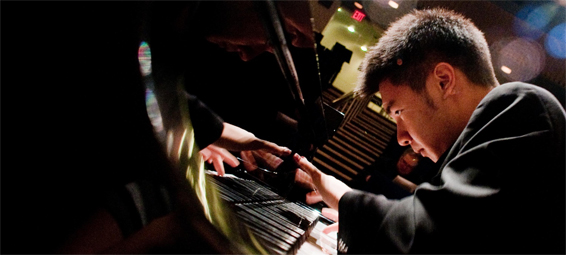Any lingering disappointment concerning the cancellation of pianist Louis Lortie’s all-Liszt recital on the Cliburn concert series disappeared immediately when his replacement, 17-year-old Conrad Tao, began playing Tuesday night at Bass Performance Hall in Fort Worth.
Tao had already impressed doubters—including me—last May when he brought insight and warmth to Shostakovich’s Piano Concerto No. 1 in a performance with the Dallas Symphony.
But there was still more than a little reason to be skeptical going into the concert hall on Tuesday night: Tao had selected a program heavy with warhorses, including Beethoven’s Appassionata Sonata, sets of Preludes of Debussy and Rachmaninoff, and the piano transcription of Stravinsky’s Petrouchka.
And the riskiest item on the agenda came first: J.S. Bach’s French Overture in B minor, a cycle of dances and related pieces thick with emotional involvement and counterpoint, but designed for the lean resonance of the harpsichord and the intimate spaces of the early eighteenth century.
Tao, after literally trotting toward onstage, chose to call on the full resources of the modern concert grand, including a broad volume range and an extremely generous use of the pedal—and managed to do so without falling into anachronism. In short, he continually uncovered the energy and emotional underpinnings inherent in this music, reaching toward the timeless, universal qualities it contains.
Beethoven’s Appassionata Sonata was equally breathtaking, beginning with Tao’s awe-inspiring voicing of those haunting opening octaves. In the middle movement and Finale, he continued to display an almost magical ability to explore coloristic possibilities and to find striking articulations without betraying Beethoven’s fervent muscularity.
After intermission, Tao concentrated on music written in the epoch-shattering early years of the twentieth century. The most impressive element here, along with a continued extravagant approach to sonority via the pedal, was his breathtaking command of rubato—and his ability, through subtle give and take of tempo, to make these works of Rachmaninoff, Debussy, and even Stravinsky sing.
Fort Worth’s audience of piano connoisseurs demanded encores, of course. Tao responded with the almost humorous virtuosity of Liszt’s Sixth Hungarian Rhapsody (a polite tip of the hat to the all-Liszt event originally scheduled for the evening) and one of his own compositions, “Catharsis,” a brief showpiece drawing on Glass-style harmonic minimalism and pleasantly exploiting Tao’s own amazing virtuosity.
Image courtesy of IMG Artists






